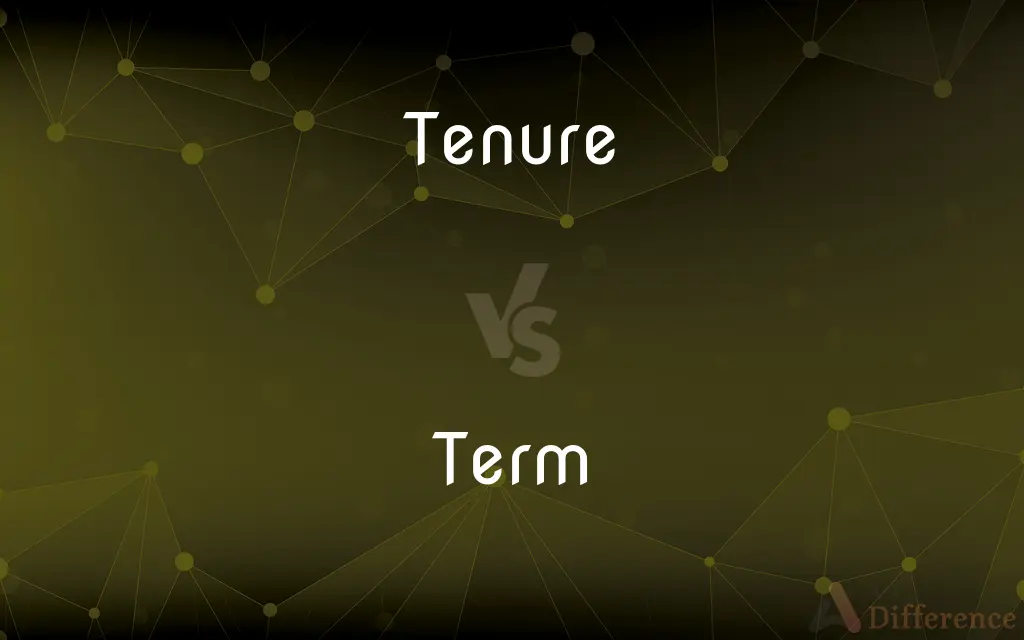Tenure vs. Term — What's the Difference?
Edited by Tayyaba Rehman — By Urooj Arif — Updated on March 19, 2024
Tenure refers to the permanent status often granted to professors or teachers after a probationary period, ensuring job security, while term denotes a fixed or limited period of time someone holds a position or office.

Difference Between Tenure and Term
Table of Contents
ADVERTISEMENT
Key Differences
Tenure in the academic world implies a level of job security granted to educators, usually after a period of evaluation, signifying they cannot be dismissed without just cause. This concept is pivotal in academic freedom, allowing professors to explore, research, and teach potentially controversial topics without fear of job loss. On the other hand, a term refers to the specified duration someone serves in a particular role or position, such as a politician's term in office or the length of time an agreement is valid. Terms are inherently finite and come with an understanding of a beginning and end date.
The process of achieving tenure involves rigorous review of a candidate's teaching, research, and service to the institution, reflecting a commitment to excellence and contribution to the academic community. Conversely, terms are often predefined and can be subject to renewal or extension based on performance, election, or other criteria, but they do not inherently offer the same level of job security or permanence as tenure.
Tenure is particularly relevant in educational and some research institutions, underscoring a long-term commitment between the institution and the individual. Terms, however, are widely applicable across various fields, including politics, law, contracts, and temporary employment, highlighting the transient nature of the engagement.
While tenure emphasizes stability and protection for academic professionals, fostering an environment for free intellectual exploration, terms indicate a more temporary or cyclical leadership, representation, or agreement, necessitating periodic reassessment or renewal.
Comparison Chart
Definition
Permanent status granted to educators, ensuring job security.
Fixed duration for holding a position or agreement.
ADVERTISEMENT
Key Feature
Job security and academic freedom.
Specified duration with a start and end.
Applicability
Primarily in academic and research institutions.
Broad, including politics, contracts, and employment.
Evaluation Process
Based on review of teaching, research, and service.
Defined by the length of time or conditions of the role/agreement.
Implication
Long-term commitment and stability.
Temporary or cyclical engagement.
Compare with Definitions
Tenure
Permanent employment status for educators after a probationary period.
After years of rigorous research and teaching, the professor was granted tenure.
Term
Fixed duration of an elected official's office.
The senator was elected for a six-year term.
Tenure
Assurance of job security, promoting academic freedom.
Tenure allows academics to pursue controversial or innovative research without fear of dismissal.
Term
Specified period of validity for a contract or agreement.
The lease agreement outlines a term of twelve months.
Tenure
A system to evaluate and retain distinguished faculty.
The tenure process involves peer review of the candidate's contributions to their field.
Term
Length of time a person serves in a specific role.
She served a term as the chairperson of the committee.
Tenure
Protection against arbitrary dismissal for tenured faculty.
His tenure protected him during the university's controversial curriculum overhaul.
Term
Predefined period for temporary employment.
His term as a visiting professor at the university lasts for one academic year.
Tenure
Institutional commitment to an educator's long-term role.
Achieving tenure marked a milestone in her academic career, reflecting the university's trust in her.
Term
Duration of a condition or phase.
The project's success will be evaluated at the end of its first term.
Tenure
The act, fact, manner, or condition of holding something in one's possession, as real estate or an office; occupation.
Term
A limited or established period of time that something is supposed to last, as a school or court session, tenure in public office, or a prison sentence.
Tenure
A period during which something is held.
Term
A point in time at which something ends; termination
An apprenticeship nearing its term.
Tenure
The status of holding one's position on a permanent basis without periodic contract renewals
A teacher granted tenure on a faculty.
Term
The end of a normal gestation period
Carried the fetus to term.
Tenure
A status of possessing a thing or an office; an incumbency.
Term
A deadline, as for making a payment.
Tenure
A period of time during which something is possessed.
Term
A fixed period of time for which an estate is granted.
Tenure
A status of having a permanent post with enhanced job security within an academic institution.
Term
An estate granted for a fixed period.
Tenure
A right to hold land under the feudal system.
Term
A word or group of words having a particular meaning, especially in a specific field
I was baffled by the technical terms that the programmers were using.
Tenure
(transitive) To grant tenure, the status of having a permanent academic position, to (someone).
Term
Terms Language of a certain kind; chosen words
Spoke in rather vague terms.
Praised him in glowing terms.
Tenure
The act or right of holding, as property, especially real estate.
That the tenure of estates might rest on equity, the Indian title to lands was in all cases to be quieted.
Term
Often terms One of the elements of a proposed or concluded agreement; a condition
Offered favorable peace terms.
One of the terms of the lease.
The terms of a divorce settlement.
Tenure
The manner of holding lands and tenements of a superior.
Term
Terms The relationship between two people or groups; personal footing
On good terms with her in-laws.
Tenure
The consideration, condition, or service which the occupier of land gives to his lord or superior for the use of his land.
Term
One of the quantities composing a ratio or fraction or forming a series.
Tenure
Manner of holding, in general; as, in absolute governments, men hold their rights by a precarious tenure.
All that seems thine own,Held by the tenure of his will alone.
Term
One of the quantities connected by addition or subtraction signs in an equation; a member.
Tenure
The term during which some position is held
Term
(Logic) Each of the two concepts being compared or related in a proposition.
Tenure
The right to hold property; part of an ancient hierarchical system of holding lands
Term
A stone or post marking a boundary, especially a squared and downward-tapering pillar adorned with a head and upper torso.
Tenure
Give life-time employment to;
She was tenured after she published her book
Term
An architectural or decorative motif resembling such a marker.
Term
To designate; call.
Term
That which limits the extent of anything; limit, extremity, bound, boundary, terminus#Noun.
"Alright, look...we can spend the holidays with your parents, but this time it will be on my terms."
Term
A chronological limitation or restriction, a limited timespan.
The term of a lease agreement is the period of time during which the lease is effective, and may be fixed, periodic, or of indefinite duration.
Term
Any of the binding conditions or promises in a legal contract.
Be sure to read the terms and conditions before signing.
Term
Specifically, the conditions in a legal contract that specify the price#Noun and also how and when payment#Noun must be made.
The latest models are available now, on the lowest terms you'll find anywhere, guaranteed.
Term
A point, line, or superficies that limits.
A line is the term of a superficies, and a superficies is the term of a solid.
Term
Relations among people.
We are on friendly terms with each other.
Term
Part of a year, especially one of the divisions of an academic year.
Term
Duration of officeholding, or its limit; period in office of fixed length.
He was sentenced to a term of six years in prison.
Near-term, mid-term and long-term goals
The term allowed to a debtor to discharge his debt
Term
The time during which legal courts are open.
Term
Certain days on which rent is paid.
Term
With respect to a pregnancy, the period during which birth usually happens (approximately 40 weeks from conception).
At term, preterm, postterm
Term
(of a patent) The maximum period during which the patent can be maintained into force.
Term
(archaic) A menstrual period.
Term
(mathematics) Any value (variable or constant) or expression separated from another term by a space or an appropriate character, in an overall expression or table.
All the terms of this sum cancel out.
Term
(logic) The subject or the predicate of a proposition; one of the three component parts of a syllogism, each one of which is used twice.
Term
(astrology) An essential dignity in which unequal segments of every astrological sign have internal rulerships which affect the power and integrity of each planet in a natal chart.
Term
(arts) A statue of the upper body, sometimes without the arms, ending in a pillar or pedestal.
Term
(nautical) A piece of carved work placed under each end of the taffrail.
Term
A computer program that emulates a physical terminal.
Term
One whose employment has been terminated
Term
To phrase a certain way; to name or call.
Term
(ambitransitive) To terminate one's employment
Term
Born or delivered at term.
Term neonate
Term
That which limits the extent of anything; limit; extremity; bound; boundary.
Corruption is a reciprocal to generation, and they two are as nature's two terms, or boundaries.
Term
The time for which anything lasts; any limited time; as, a term of five years; the term of life.
Term
In universities, schools, etc., a definite continuous period during which instruction is regularly given to students; as, the school year is divided into three terms.
Term
A point, line, or superficies, that limits; as, a line is the term of a superficies, and a superficies is the term of a solid.
Term
A fixed period of time; a prescribed duration
Term
The subject or the predicate of a proposition; one of the three component parts of a syllogism, each one of which is used twice.
The subject and predicate of a proposition are, after Aristotle, together called its terms or extremes.
Term
A word or expression; specifically, one that has a precisely limited meaning in certain relations and uses, or is peculiar to a science, art, profession, or the like; as, a technical term.
In painting, the greatest beauties can not always be expressed for want of terms.
Term
A member of a compound quantity; as, a or b in a + b; ab or cd in ab - cd.
Term
The menses.
Term
Propositions or promises, as in contracts, which, when assented to or accepted by another, settle the contract and bind the parties; conditions.
Term
In Scotland, the time fixed for the payment of rents.
Term
A piece of carved work placed under each end of the taffrail.
I can not speak in term.
Term
To apply a term to; to name; to call; to denominate.
Men term what is beyond the limits of the universe "imaginary space."
Term
A word or expression used for some particular thing;
He learned many medical terms
Term
A limited period of time;
A prison term
He left school before the end of term
Term
(usually plural) a statement of what is required as part of an agreement;
The contract set out the conditions of the lease
The terms of the treaty were generous
Term
Any distinct quantity contained in a polynomial;
The general term of an algebraic equation of the n-th degree
Term
One of the substantive phrases in a logical proposition;
The major term of a syllogism must occur twice
Term
The end of gestation or point at which birth is imminent;
A healthy baby born at full term
Term
(architecture) a statue or a human bust or an animal carved out of the top of a square pillar; originally used as a boundary marker in ancient Rome
Term
Name formally or designate with a term
Common Curiosities
Can a term be extended?
Yes, terms can be extended based on performance, agreement, or re-election, depending on the context.
Is tenure guaranteed for all professors?
No, tenure is earned through a rigorous evaluation process and is not guaranteed to all educators.
How is tenure awarded?
Tenure is awarded based on a comprehensive review of an educator's research, teaching, and service contributions, often involving peer evaluation.
What happens when a term ends?
Upon the end of a term, the position may be vacated, renewed, or filled by another individual, depending on the context and agreements in place.
Are terms applicable to contracts only?
Terms apply to a wide range of contexts, including contracts, employment, political offices, and more, indicating any fixed-duration commitment.
Can a term limit be imposed on tenured positions?
Tenured positions do not have term limits in the traditional sense, as tenure implies ongoing employment until retirement or resignation, barring exceptional circumstances.
Do all universities offer tenure?
Not all institutions offer tenure, and the availability and criteria for tenure can vary significantly between universities and colleges.
Does tenure apply outside of academia?
While primarily associated with academia, the concept of tenure can apply to certain research or legal positions, but it's less common.
Can tenured professors be fired?
While tenure provides significant job security, tenured professors can still be dismissed for just cause, such as professional misconduct or severe budgetary constraints.
What's the difference between a term and a tenure-track position?
A term is a fixed period, while a tenure-track position is a pathway that may lead to tenure, offering a provisional period during which the candidate is evaluated for permanent status.
Share Your Discovery

Previous Comparison
Tone vs. Register
Next Comparison
Salami vs. FuetAuthor Spotlight
Written by
Urooj ArifUrooj is a skilled content writer at Ask Difference, known for her exceptional ability to simplify complex topics into engaging and informative content. With a passion for research and a flair for clear, concise writing, she consistently delivers articles that resonate with our diverse audience.
Edited by
Tayyaba RehmanTayyaba Rehman is a distinguished writer, currently serving as a primary contributor to askdifference.com. As a researcher in semantics and etymology, Tayyaba's passion for the complexity of languages and their distinctions has found a perfect home on the platform. Tayyaba delves into the intricacies of language, distinguishing between commonly confused words and phrases, thereby providing clarity for readers worldwide.
















































